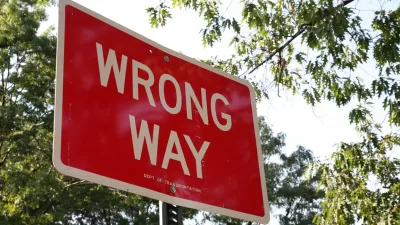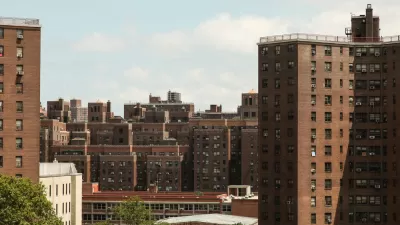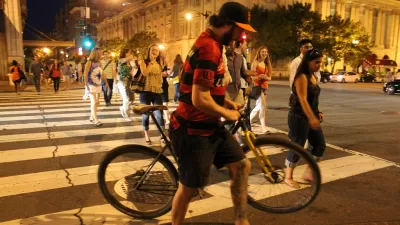The tendency of transportation planning of the 20th and 21st centuries to negatively impact poor and minority populations received deep attention on national media outlets over the past few days.

Corinne Ramey writes a long and thorough account of the inequity built into the U.S. transportation system. Ramey notes early in the article that race and transportation "have long been intertwined, whether it be federally funded highways that plowed through, or isolated, minority neighborhoods; Rosa Parks and the Montgomery Bus Boycott; or segregated streetcars and trolleys." Despite the progress made in recent decades, according to the article, discrimination is still built into the transportation system of the United States.
The article begins by citing the example of Buffalo, New York, where the Peace Bridge connecting the United States with Fort Erie in Canada. "In the shadow of the bridge sits a small neighborhood called the West Side, where the asthma rate is more than four times the national average, and residents report a host of other health issues." Rather than heading local concerns about the health impacts of the bridge, "[a] proposed expansion of the bridge’s on- and off-ramps will further encroach into the neighborhood’s streets."
But Buffalo only provides the first example of the inequity that is built into every corner of the country. Here, Ramey reveals the larger focus of the investigation: "Based on recent complaints provided by the Federal Highway Administration and Federal Transit Authority through Freedom of Information Act requests, as well as older complaints and several lawsuits, I closely examined about 40 cases of racial discrimination in transportation planning, many from the past 15 years."
The remainder of the piece delves into many examples from all over the country, with references to the prevailing scholarship on the subject.
Of note regarding the article: At some point, Slate changed the headline from a more inflammatory title "America's Transportation System Is Racist" to the current "America's Unfair Rules of the Road."
Kevin D. Williamson follows Ramey's reporting with a response in National Review. Although Williamson recommends the Slate article but pivots to describe the transportation system as "royalist" rather than racist.
FULL STORY: America’s Unfair Rules of the Road

Maui's Vacation Rental Debate Turns Ugly
Verbal attacks, misinformation campaigns and fistfights plague a high-stakes debate to convert thousands of vacation rentals into long-term housing.

Planetizen Federal Action Tracker
A weekly monitor of how Trump’s orders and actions are impacting planners and planning in America.

In Urban Planning, AI Prompting Could be the New Design Thinking
Creativity has long been key to great urban design. What if we see AI as our new creative partner?

Portland Raises Parking Fees to Pay for Street Maintenance
The city is struggling to bridge a massive budget gap at the Bureau of Transportation, which largely depleted its reserves during the Civd-19 pandemic.

Spokane Mayor Introduces Housing Reforms Package
Mayor Lisa Brown’s proposals include deferring or waiving some development fees to encourage more affordable housing development.

Houston Mayor Kills Another Bike Lane
The mayor rejected a proposed bike lane in the Montrose district in keeping with his pledge to maintain car lanes.
Urban Design for Planners 1: Software Tools
This six-course series explores essential urban design concepts using open source software and equips planners with the tools they need to participate fully in the urban design process.
Planning for Universal Design
Learn the tools for implementing Universal Design in planning regulations.
Gallatin County Department of Planning & Community Development
Heyer Gruel & Associates PA
JM Goldson LLC
City of Camden Redevelopment Agency
City of Astoria
Transportation Research & Education Center (TREC) at Portland State University
Jefferson Parish Government
Camden Redevelopment Agency
City of Claremont




























